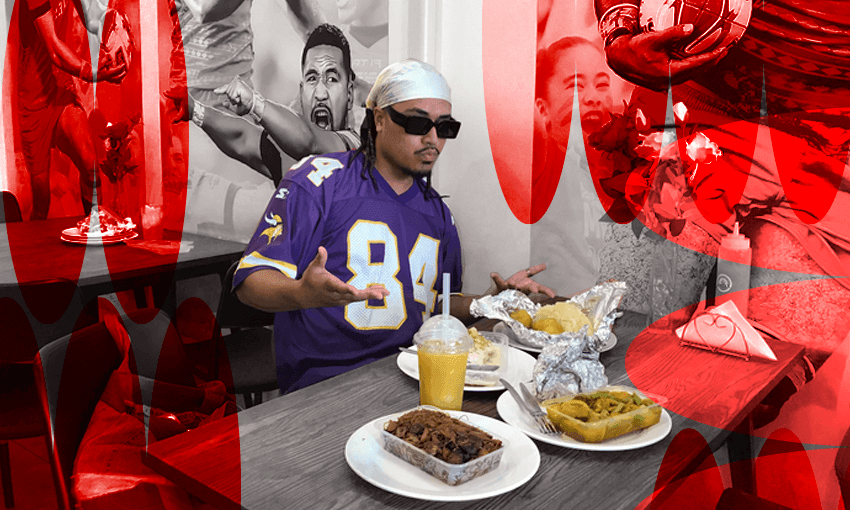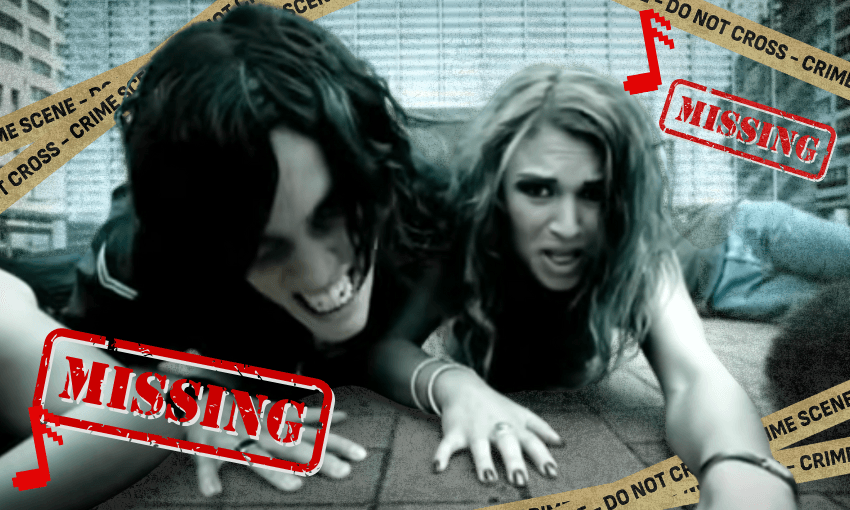The Red, White & Brass star talks spectacle, honouring family sacrifices and his debut lead role over a Tongan lunch in Otāhuhu.
Name a creative pursuit and 28-year-old Tongan New Zealander John-Paul Foliaki will give it a go. That is, if he hasn’t already.
Foliaki plays the lead role, Maka, in the just-released comedy film Red, White & Brass – his feature film debut. In the last four years he’s produced theatre, starred on TVNZ reality talent show Popstars, performed spoken word poetry and worked in front of and behind the camera across multiple television shows and music videos. He’s also been a regular face in local advertising campaigns, released his own self-funded R&B and reggaeton inflected music and corresponding videos and opened for Sean Kingston.
A week before Red, White & Brass premieres, we meet at Otāhuhu Tongan eatery Hala Hihifo for lunch. Foliaki bounds around the bend of Great South Road in a purple Minnesota Vikings jersey, black rectangular framed sunglasses and a denim patchwork bag. His braided hair is shrouded by a silk bandana. It’s his second time here today – he’s just delivered a load of takeaway food to his Nana, who he lives with along with his parents a five minute drive away.
Inside Halo Hihifo, the walls are plastered with larger-than-life action shots of Tongan rugby league players. One side of the room is covered in wallpaper printed with a mix of Tongan coat of arms and Mate Ma’a Tonga crests. Each table is embellished with red and white-petalled plastic roses. Everywhere you look, it’s Tongan pride distilled as decor.
“I will always say I’m a proud son of South Auckland,” Foliaki says as we join the line alongside a counter abundant with Tongan delicacies. Foliaki moved to Papatoetoe with his family from Remuera as an eight-year-old almost two decades ago. Countering the relentlessly negative narratives that surround the corner of Tāmaki Makaurau he calls home is a common thread in his work. “I mean, look at this place, it’s 1pm and these people are living their best lives and having a mean-as feed for their lunch break.”
At the till, Foliaki recites our order in Tongan. We cart foil-wrapped manioke and kumala, lu pulu masima, kale sipi, sapasui, ika lolo’i and a tall cup of ‘otai to our table. “Oh my gosh, I love this song, this is why I love coming here, it’s just Tongan songs back to back,” he says while lifting a piece of coconut-doused fish from the plastic container to his plate.
This spot is a regular haunt for Foliaki, and he sometimes finds himself here five days a week. “My nana is from Vava’u in Tonga and she always talks about how much he misses the islands, being down in the clear blue sea, getting fish, fresh octopus,” he says. “She’s not well at the moment but she’s comfortable and getting her food that she likes to eat is one thing I can do to make her day easier.”
His grandparents on both his parents’ sides of the family moved from Tonga to Auckland in the 1970s. Both sides of his family are filled with nurses, doctors, accountants, businesspeople and academics. His mum has a PhD in education and his dad is a lawyer. Foliaki has spent most of his life following in those same academic footsteps too, studying subjects like physics and accounting in high school, graduating from law school at the University of Auckland and then eventually working at PwC. “I thought that’s what making the most out of your family’s sacrifices looked like,” he says.
That role at PwC began in 2018 and involved analysing corporate teams in order to advise on improvements in systems and team culture. Despite the fact it didn’t align with his desire to do work that served his own community, Foliaki was drawn in by the prospects of working with people. “But at the end of the day, I guess I really don’t care about improving some bank’s team culture,” he says. “I felt like I was working for a money-making machine.”
The suit pants, the cropped corporate haircut, the early-morning train rides from Papatoetoe to Britomart, but mostly the type of work, chipped away at Foliaki. “I was really unhappy,” he says. “It was less than a year into the job but it felt like a lifetime, and I ended up having an anxiety attack in the work bathroom.” That same night, realising his mental health was deteriorating, he sent a resignation email to his manager.
That was a step out of one pathway, but it wasn’t necessarily a step into a new one. He had no job, no money and no idea what to do next. He spent that summer in Tonga for a family reunion, mostly swimming, lying on the beach or with cousins. It was a period of time he describes as “grounding”.
“I know it wouldn’t have been an easy lifestyle back in the islands, but you can see your friends, your family, you’re surrounded by your community, your church – it’s all right there in the village,” he says. With a tangle of vermicelli on his fork suspended in the air, Foliaki pauses before continuing, “I remember thinking ‘I can’t believe my family and grandparents left this lifestyle for me to go and work somewhere that I’m not happy’, that just didn’t make sense to me.”
Those beachside reflections gave way to a decision to pursue whatever creative opportunities arose – and it’s now led to his first feature film role.
You first meet Foliaki’s character in Red, White & Brass as he stands on the roof of a Wellington villa engulfed in red and white in celebration of the 2011 Rugby World Cup, and more specifically, the Tongan rugby team. “We’re gonna show our pride to the world,” he exclaims.
The film, which is inspired by a true story, follows Maka as he attempts to secure tickets for the 2011 France v Tonga Rugby World Cup match by creating a Tongan brass band or ifi palasa to perform ahead of the game. The problem is, neither Maka nor his “band” have played in a brass band before. Both Foliaki and his character share the same brand of resourcefulness, unshakeable tenacity and a knack for generating spectacle – an energy that could probably best be encompassed by a word discussed frequently in relation to the film, māfana.
It’s a pillar of Tongan identity, but “there’s no proper explanation for māfana, literally it means warm or a state of warmness,” says Foliaki. “In terms of a feeling, it’s that feeling of pride, joy, happiness, all coming together and reaching a pinnacle moment, where you get up and you can’t contain how happy you’re feeling, where you can’t contain yourself.”
Looking around, it’s clear that the restaurant we’re sitting in is an expression of that energy. So too, are the familiar sights of homes or cars in Aotearoa ablaze with Tongan flags, just like that in the film. It lies behind the success of the Tongan rugby team against France in the 2011 Rugby World Cup, despite comparatively limited resources. That fueled the 2017 protests by Tongan league fans in Tāmaki Makaurau. It’s that feeling that propels the characters in the film to form a brass band – against all odds. It’s how Foliaki ended up with the role in the film too.
The producer of Red, White & Brass, Halaifonua Finau, noticed Foliaki while he was auditioning for The Panthers television series. “I noticed this dude with a big afro pacing up and down the room looking dodgy and so I started a conversation with him. It was JP (Foliaki) and he had just shared with me that he had lost his car keys,” Finau told The Spinoff. “However, they weren’t actually his keys as he was borrowing the car. He had just got off the phone with the locksmith and was told it would cost $300 to get a replacement and he said to me, ‘I’m going to find those bloody damn keys’ and immediately I thought, ‘this guy is going to be Maka.’”
“As a Tongan, when you do anything, you’re doing something that’s so much more than just yourself. This movie was an opportunity for me but I’m really doing it for my family, the young kids in my family, for my parents and the sacrifices that my grandparents made,” Foliaki tells me.
“If we’re talking about honouring sacrifices, then we should be doing it in a way where we’re happy, of course there’s always a struggle, but at least struggle in an area that you love.”
Co-existing alongside this vibrant energy in the film is the weight of expectations from family, church, community and from those on the outside. That’s an experience Foliaki believes is shared by most young Tongans living in Aotearoa.
At times, he’s found his attempts to resist being boxed in by his own community only leading to being boxed in by another. On Popstars, for example, “I realised I was kind of playing a character and getting used to being this person that they wanted me to be for screen,” he says. “Just this loud, confident, funny, R&B boy from the South Side.”
“I was trying to become an artist, just trying to fight to be myself. But then there’s the flip side of people always expecting you to be the loud one, to be the funny one, to be the one who brings the good times,” he says. “It can get heavy sometimes, sometimes I’m just not in the damn mood, I just want to sit down and eat my food.”
Putting down his fork, Foliaki gestures at his bag hanging on the corner of the chair next to him – a vintage denim tote he found in an op shop in Kaitaia while filming for upcoming television series Far North. “I’ve always got a bag with me now and people are like ‘oh that’s another new bag’.” He loves wearing crop tops and having his nails painted. At the Wellington premiere for the film he wore a modernised ta’ovala made by Frankie Lolohea. Far from the conventions of corporate wear, Foliaki plays with fashion as a means to challenge expectations from his own community and outside communities too.
Then there’s his musical output: R&B and reggaeton bops released under his moniker JP with sleek but racy self-funded music videos (The most expensive being Pull Up (Remix) which cost over $10,ooo and was funded by Foliaki and a crowd-funding campaign) that unsurprisingly didn’t fly without controversy from within his family and community. “It’s funny because all of that is a side of me too,” he says. “This is what a Tongan male in 2023 can look like – there’s so many different versions.”
Before packing our leftovers away to take home to his nana, Foliaki reaches into his denim op shop bag and says, “the thing is, I’ve also got a bag within a bag”.
“So this is for when I don’t want to take the whole bag so I just pull this one out and pop my things in,” he says while pulling out a miniscule holographic satchel that his friends have named “Penelope”. “It’s just the whole stupidity of it all, but it’s so funny and I love it – it’s a spectacle really.”
Red, White and Brass is in cinemas now.



